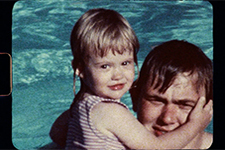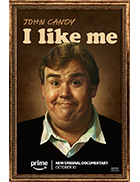John Candy: I Like Me
|  Colin Hanks’s documentary John Candy: I Like Me begins with an interview with Bill Murray, who jokes almost immediately that he doesn’t have a bad thing to say about the comedic actor, who helped found the Canadian sketch comedy series Second City Television and went on to a successful Hollywood career in the 1980s and ’90s. “I hope you find some dirt on him,” Murray quips, but there is little or no dirt to be found here. Hanks’s film is not a doctored and scrubbed hagiography that hides the warts because, if the numerous interviewees are to be believed, Candy was a genuinely good guy, which makes him a refreshing subject given how inured we have become over the years to corruption, malfeasance, and generally awful behavior by celebrities and politicians. Sometimes it is nice to see one of the nice guys win. Of course, as Hanks’s film makes clear, things weren’t always easy for Candy, and his success in film and television was not without its price. This is the actor-director’s third feature documentary, following All Things Must Pass (2015) and Eagles of Death Metal: Nos Amis (2017), and he has a solid grasp of the form and how his interview subjects can weave together a compelling narrative of not just Candy’s life, but his character and significance (in this regard, it is especially importantly that everyone interviewed knew and worked with Candy directly; no outside film critics or historians or pundits weigh in). Born into a Catholic family in Toronto, Canada, Candy lost his father at a young age, an event that everyone close to him recognizes was a defining moment that shaped his approach to life. Having to step into the void left by his father when he was still a child, he grew up taking care of everyone around him, which speaks to the immensity of his heart, but also his vulnerability. Candy’s eventual success followed the path from theatre work and stand-up comedy, to an early spot in Toronto’s Second City troupe, which then led to one of the lead roles in Second City Television, a Canadian Saturday Night Live that proved to be a major hit in the late 1970s and early ’80s, launching the careers of not just Candy, but also Eugene Levy, Catherine O’Hara, Martin Short, Dave Thomas, and Rick Moranis (all of whom, with the exception of Moranis, gave interviews for the documentary). Candy’s Second City work caught the eye of Steven Spielberg, who tapped him for a role in his disastrous comedy spectacular 1941 (1979). Despite that movie’s critical and commercial drubbing, he landed supporting roles in numerous hit films, including The Blues Brothers (1980), Stripes (1981), and National Lampoon’s Vacation (1983) before his breakout role as Tom Hanks’s obnoxious older brother in Splash (1984). Much attention is given to his numerous collaborations with John Hughes: Planes, Trains, and Automobiles (1987), which, understandably, gets the most screen time and is the source of the documentary’s poignant title; The Great Outdoors (1988); Uncle Buck (1989); and Home Alone (1990). Some of Candy’s lesser efforts are minimized or ignored all together, but on the whole it paints a fairly robust portrait of his wide-ranging career on-screen. The breadth of people with whom he worked who appear in the documentary—Tom Hanks, Mel Brooks, Chris Columbus, Harold Ramis—attests to the immensity of his career, however underappreciated it often was at the time (his lack of an Oscar nomination for Planes, Trains, and Automobiles is still disheartening) and short-lived it turned out to be. However, it is his life off-screen that provides the film’s most meaningful moments. Interviews with his widow and his son and daughter, along with substantial home video footage, paint a touching portrait of his life when he wasn’t in front of a movie camera, which appears to have been as “nomal” as a movie star could make it. Candy wrestled with addictions, notably smoking, drinking, and eating, which ultimately led his untimely death at age 44. His weight, which always preceded him in the public imaginary, was a constant struggle, and video of him exercising at home is contrasted with numerous television interviews in which otherwise well-meaning interviewers lead with a comment about his weight, many of which elicit a clearly pained response from Candy before he slides into comical movie-star mode. Such moments are painfully humanizing—difficult to watch, but a sharp and necessary reminder of how unfortunately comfortable many people are joking about others’ weight with no regard for the difficulties those people face. The most humanizing moment in the film, though, comes courtesy of Macaulay Culkin, who first worked with Candy on Uncle Buck. Culkin relates the story of how Candy was the only person on set who recognized how much Macaulay, then only 8 years old, was struggling under the yolk of his abusive father and tried to reach out to him. Tears well in the now-grown actor’s eyes as he tells the story, and only the hardest heart in the room will not feel their own ducts answering in kind. Copyright © 2025 James Kendrick Thoughts? E-mail James Kendrick All images copyright © Amazon Studios |
Overall Rating: 

 (3)
(3)


